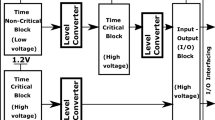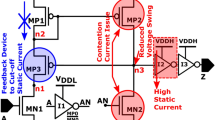Abstract
Low power on-chip interconnect technique is important for deep submicron SOC design. In this paper, a novel low swing drivers scheme based on charge redistribution is proposed. Significant reduction in power dissipation is achieved by dividing the full signal swing into several lower ones. The proposed circuits are especially suitable for driving multi-branch transmission wires by utilizing higher efficiency of charges. Compared with the reference design, the new scheme can reduce power dissipation by more than 66% as shown by HSPICE simulation while driving three branches. The proposed circuits have been fabricated and its effectiveness has been verified by measurement results.
Similar content being viewed by others
References
Liu D, Svensson C. Power consumption estimation in CMOS VLSI chips. IEEE J Solid-State Circ, 1994, 29: 663–670
Qiao F, Yang H Z, Huang G, et al. Implementation of low-swing differential interface circuits for high-speed on-chip asynchronous interconnection. Sci China Ser F-Inf Sci, 2008, 51: 975–984
Zhang H, George V, Rabaey J M. Low-swing on-chip signaling techniques: effectiveness and robustness. IEEE Trans VLSI Syst, 2000, 8: 264–272
Pangjun J, Sapatnekar S S. Low-power clock distribution using multiple voltages and reduced swings. IEEE Trans VLSI Syst, 2002, 10: 309–318
Rjoub A, Koufopavlou O. Low voltage swing gates for low power consumption. In: Proc IEEE Int Symp Circ Syst, Orlando, USA, 1999. 1: 234–237
Asgari F H A, Sachdev M. A low-power reduced swing global clocking methodology. IEEE Trans VLSI Syst, 2004, 12: 538–545
Larsson P. Parasitic resistance in an MOS transistor used as on-chip decoupling capacitance. IEEE J Solid-State Circ, 1997, 32: 574–576
Wang C Y. Implementation of space-efficient voltage-insensitive capacitances in integrated circuits. In: IEEE International Symposium on Circuits and Systems, Island of Kos, Greece, 2006. 1876–1879
Chang Y W, Chang H W, Lu T C, et al. Charge-based capacitance measurement for bias-dependent capacitance. IEEE Electr Device Lett, 2006, 27: 390–392
Rabaey J M, Chandrakasan A, Nikolic B. Digital Integrated Circuits: A Design Perspective. 2nd ed. Beijing: Publishing House of Tsinghua University, 2004. 18–22, 138–144, 188
Rjoub A, Koufopavlou O. Efficient drivers, receivers and repeaters for low power CMOS bus architectures. In: Proc IEEE International Conference on Electronics, Circuits and Systems, Pafos, Cyprus, 1999, 2: 789–794
Svensson C. Optimum voltage swing on on-chip and off-chip interconnect. IEEE J Solid-State Circ, 2001, 36: 1108–1112
Liu Y, Cai J P, Hao Y, et al. A low swing differential signaling circuit for on-chip global interconnects. In: Proc. International Conference on Solid-State and Integrated-Circuit Technology. Beijing, China, 2008. 1693–1696
Author information
Authors and Affiliations
Corresponding author
Rights and permissions
About this article
Cite this article
Wu, F., Jia, S., Wang, Y. et al. Low swing drivers based on charge redistribution. Sci. China Inf. Sci. 53, 2377–2388 (2010). https://doi.org/10.1007/s11432-010-4084-8
Received:
Accepted:
Published:
Issue Date:
DOI: https://doi.org/10.1007/s11432-010-4084-8




